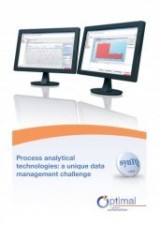‘Process Analytical Technologies: a unique data management challenge’
Process Analytical Technologies (PAT) have the potential to revolutionise pharma manufacturing, by compensating for input variability, tightening finished product specifications, cutting production cycle times and, ultimately, enabling the real-time release of products to market.
A successful PAT implementation requires companies to master a broad set of new capabilities and new technologies, and to develop the processes to integrate those skills into their product development and manufacturing operations.
“PAT presents a data management challenge that is unlike anything else experienced today, in the pharma sector or elsewhere.”
Author, Martin Gadsby, Director of Optimal.
This challenge arises from three basic characteristics of PAT implementations: analytical datasets that are large, complex and often difficult to synchronise and collect; the requirement for complete traceability and comprehensive records of collected and derived data, models and process parameters; and the commercial imperative of rapid deployment in your target environment together with the essential improvements in quality and quickly realised ROI.
This paper from Optimal looks in detail at each of these requirements, and makes the case for the use of a dedicated PAT implementation software environment (Optimal synTQ®) to provide a unified framework for data collection, model development, process understanding, process control and continuous improvement.

Recent Comments